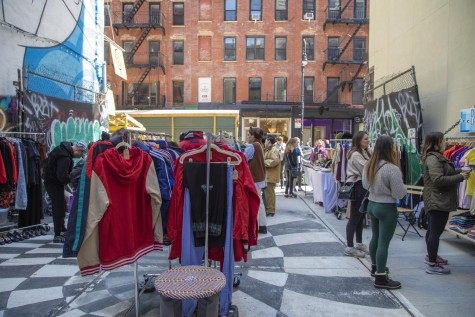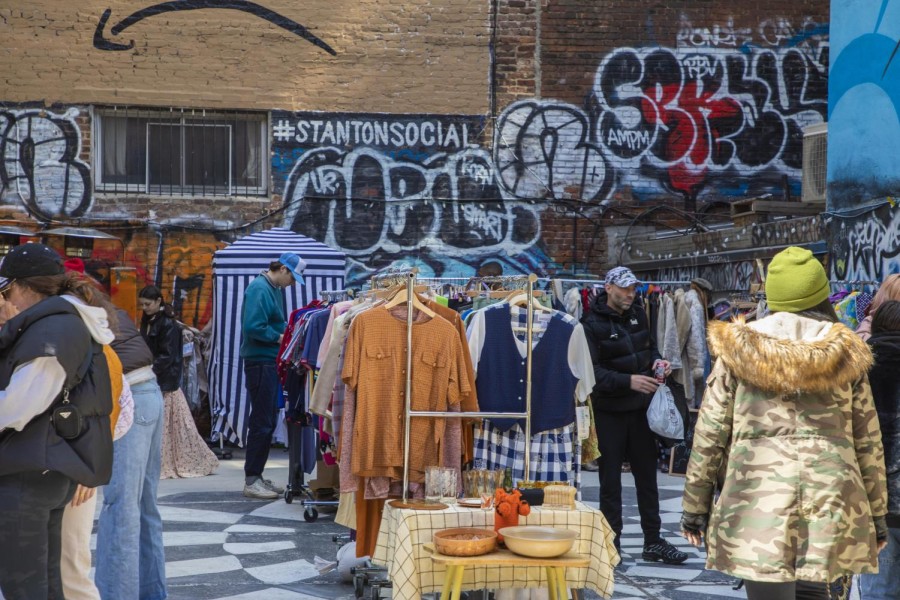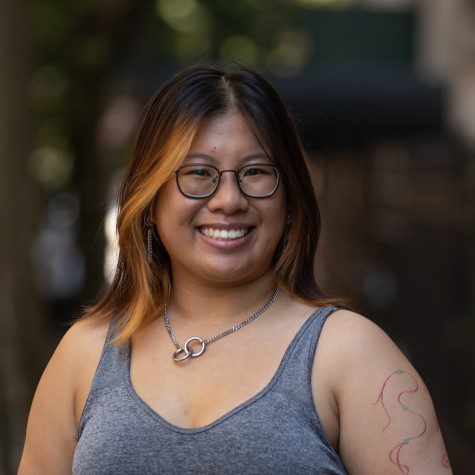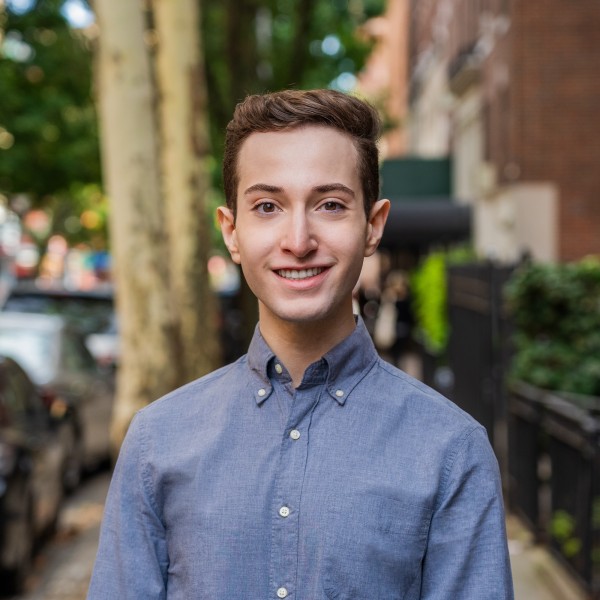Ludlow Flea Market offers unique, sustainable pieces at affordable prices
Stories from a vibrant community of upcyclers and secondhand fashion enthusiasts who’ve set up shop in the Lower East Side.
Ludlow Flea Market is a small flea market at 159 Ludlow Street that opens on Fridays, Saturdays and Sundays. (Photo by Joshua Plutchik)
April 29, 2022
The Ludlow Flea Market at 159 Ludlow St., a 20-minute walk from NYU’s Washington Square Park campus, was my first secondhand shopping experience. I had absolutely no idea what to expect.
The first thing that surprised me about Ludlow Flea was the small space. I was on the opposite side of the street and initially walked right past it. I had imagined a block full of little carts, booths, music and people, perhaps similar to the Chelsea Market’s bright and lively energy. Instead, I was met by an unassuming cement lot sandwiched between convenience stores and delis, blending into the bustle of the street surrounding it.
After surveying the items on display, I wasn’t sure how to feel. The T-shirts and crew-neck sweatshirts that filled the space definitely had some wear to them. However, buried among the more basic clothing pieces were designer garments: Dior blazers and dress pants, Reiss dresses and skirts and Gucci handbags, all priced fairly.
What the Ludlow Flea Market lacked in space and appearance, it made up for in character, atmosphere and community. I was pleasantly surprised to see that the clothes were priced very reasonably. There was a feeling of transparency and honesty among the sellers and the buyers. It didn’t feel as though their objective was to simply sell the clothing, but rather to find it a home.
The handful of vendors present filled the space with their enthusiasm, conversation and helpfulness. Getting to speak with the sellers about their items made my shopping experience much much more enjoyable and personal.
Futa Mitakara, one of Ludlow Flea’s sellers, is a Japanese designer who frequents flea markets with his products. Secondhand clothing like T-shirts, sweatshirts, pants, trucker hats and a selection of handbags accompanied Mitakara at his booth. However, what caught my eye was not the muted shirts and bottoms that hung on clothing racks, but the vibrant and uniquely stitched items that lay on a folded table.
Mitakara created AekT, his own clothing business, last September. At first, he was only upcycling his secondhand items, but eventually realized that he had a passion for creating. Afterwards, he began crafting hand-stitched items, including many crochet pieces.
Another vendor, Mimi Urízar-Ávila, a College of Arts and Sciences alumni, sells at Ludlow because of its proximity to her apartment and the community she’s fostered.
“All the vendors just hang and help each other out,” Urízar-Ávila said. “I’ve made a lot of friends there and the vending community is overall super supportive and collaborative.”
For Urízar-Ávila, a community like Ludlow Flea is the norm. Buying second-hand was something she grew up with — her father taught her to thrift and it gradually became second nature.
“[My dad] would also like to collect old tennis rackets, so we’d sometimes go and just help him look for them,” Urízar-Ávila said. “Then in middle school I would go thrifting and start dyeing or bleaching and cutting clothes up to mimic things I wanted but couldn’t afford. Slowly people at my school liked what I did; my jewelry as well. I started selling jewelry and clothes to my peers here and there really young, like around 15 and 16.”

The clothes she sells couldn’t be boiled down to a specific style — I can only describe it as a combination of punk, experimental, 1990s and 2000s influences. Similar to her clothes, Urízar-Ávila’s jewelry encapsulates a similar punk style but with playful grace. Many of her pieces incorporate pearls, beaded bowed earrings and pink motifs with others focusing on a more grungy aesthetic.
The next vendor I spoke with was Marie Caroline Shulman, and she was an absolute delight. Originally from France, she moved to the United States and worked in corporate law until 13 years ago, when she decided to pursue her own fashion business.
However, over the last two years the pandemic has forced Shulman to close her store on Canal Street. Despite that setback, Shulman is reimagining her business and hoping to reopen a store on Ludlow Street, not far from where the flea market is located. Her two brands include Preppy Trendy, a sustainable clothing boutique, and Feline Jewelry Studio, which offers beautiful vintage and upcycled pieces. I ended up buying two rings from her afterwards.
Supporting small businesses, thrifting and shopping sustainably has recently become a trend in the fashion world. The vendors I spoke with all agreed that they have seen more interest in their products over the past year and a half. Glad as they are, they hope that this will last more than a few seasons, not only for themselves but also for the sake of the ecosystem and the harm that has come to it as a result of overproduction.
There is a unique energy and environment at this flea market that I had never experienced before. I was able to learn more about the vendors, form a more personal bond with them and support their businesses in a mutually beneficial way. The opportunity to meet with and forge relationships with the people selling our clothing is something we miss out on at larger stores.
The Ludlow Flea Market was an amazing weekend afternoon experience, and I can’t wait to go back! It is open Fridays through Sundays from 11 a.m. to 7 p.m. every week.
Contact Bella Ingber and Mayee Yeh at [email protected].


























































































































































